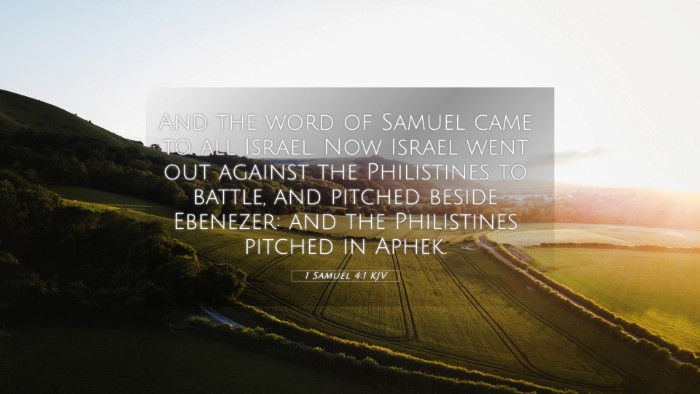Meaning and Interpretation of 1 Samuel 4:1
1 Samuel 4:1 states, "And the word of Samuel came to all Israel. Now Israel went out to battle against the Philistines and encamped beside Ebenezer; and the Philistines encamped in Aphek." This verse introduces a significant moment in Israel's history, setting the stage for conflict and the revelation of God’s sovereignty.
Contextual Background
The context of this verse is crucial; it marks a transition in Israel's leadership as Samuel emerges as a prophet and judge. Israel facing the Philistines indicates ongoing strife with these adversaries, reflecting the larger narrative of the struggle for the Promised Land.
Insights from Commentaries
- Matthew Henry:
Henry notes that Samuel’s role is vital, as his prophetic words guide the nation. The mention of Israel going to battle implies a call to arms, but also reveals a lack of spiritual preparation. Henry emphasizes that true victory comes from alignment with God’s will, not mere military might.
- Albert Barnes:
Barnes comments on the geographical locations mentioned – Ebenezer and Aphek. He interprets these as significant, highlighting that Ebenezer means "stone of help," which could suggest a point of reliance on God. The strategic encampments symbolize the impending confrontation and God’s providential guidance in Israel's warfare tactics.
- Adam Clarke:
Clarke delves into the sociopolitical dynamics of the time, pointing out the continuing conflict with the Philistines. He suggests that Israel’s trust should be in God, and not in their strength or numbers, as past victories were granted by divine support rather than human capability.
Key Themes
This verse highlights several themes important for understanding the text:
- Divine Sovereignty: It emphasizes that God’s guidance is paramount in times of conflict.
- Spiritual Preparation: The Israelites’ readiness to fight without proper reliance on God indicates a recurring theme of spiritual straying.
- Leadership of Samuel: The emergence of Samuel as a spiritual leader showcases the need for divinely appointed guidance in Israel.
Cross-References
This verse connects with a number of other biblical passages that illuminate its meaning:
- 1 Samuel 3:19-20: Highlights the prophetic authority of Samuel.
- Exodus 17:15: The importance of Ebenezer as a stone of help, linking to Israel’s reliance on God's strength.
- Judges 10:6-7: Recurring theme of conflict against the Philistines and their consequences.
- 1 Samuel 7:2-3: A call to repentance and the importance of returning to God for victory in battle.
- Psalm 44:6-7: A reminder that victory is not by the sword, but by God's favor.
- Isaiah 43:2: Promises that when facing trials, God will be present, linking back to the need for divine support.
- Romans 8:31: If God is for us, who can be against us? This encapsulates the reliance on God’s power in conflicts.
Thematic Connections
Exploring the inter-Biblical dialogue, one can find substantial parallels and connections:
- Trust in Divine Leadership: The Echo of Biblical leadership by figures such as Moses and Joshua who similarly led Israel through crises.
- Preparation for Battle: Reflected in Ephesians 6:10-18, where believers are called to spiritual readiness.
- Historical Conflicts: The ongoing struggle with enemies throughout scripture highlights consistent themes of reliance on God.
Conclusion
In summary, 1 Samuel 4:1 is not just a historical account; it serves as a theological statement about dependence on God, the significance of divinely appointed leaders, and the ongoing struggle against adversaries. The interconnectedness of biblical texts enriches the understanding of this verse, providing invaluable lessons for contemporary readers.










